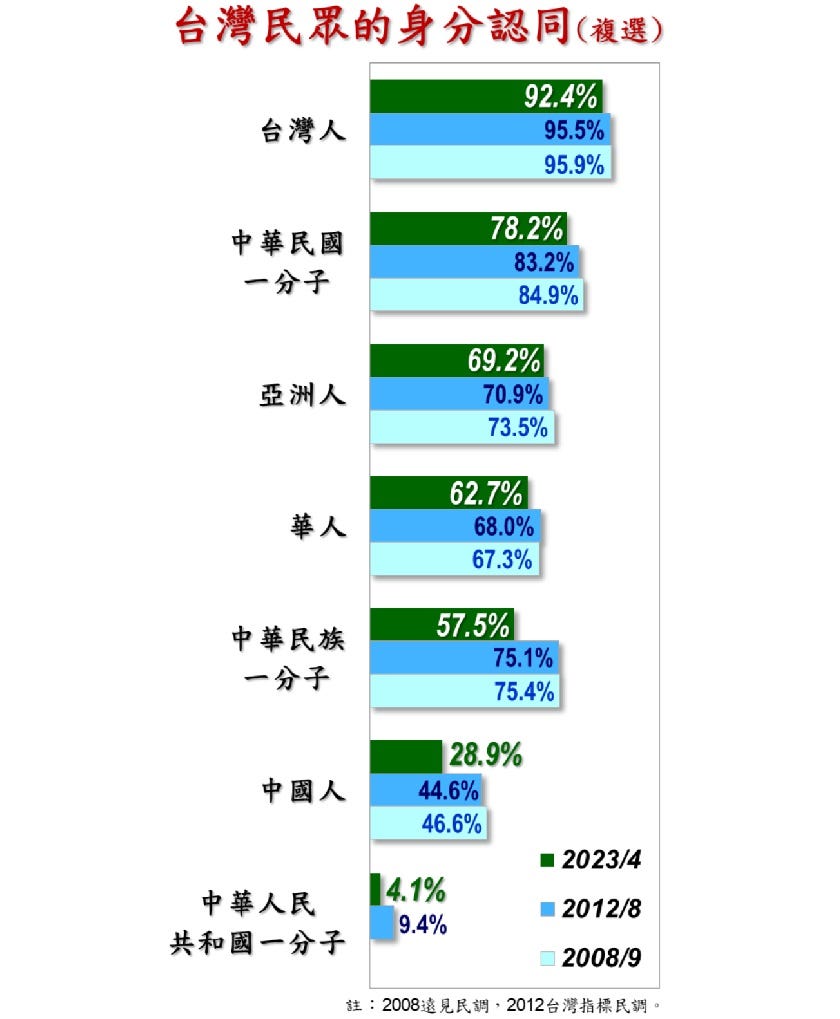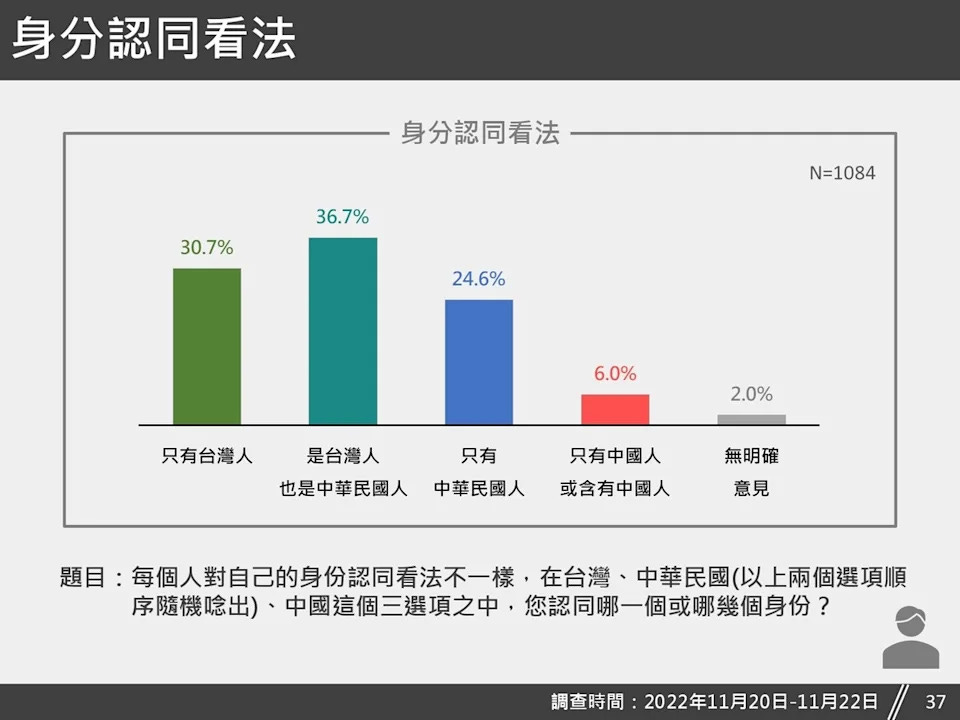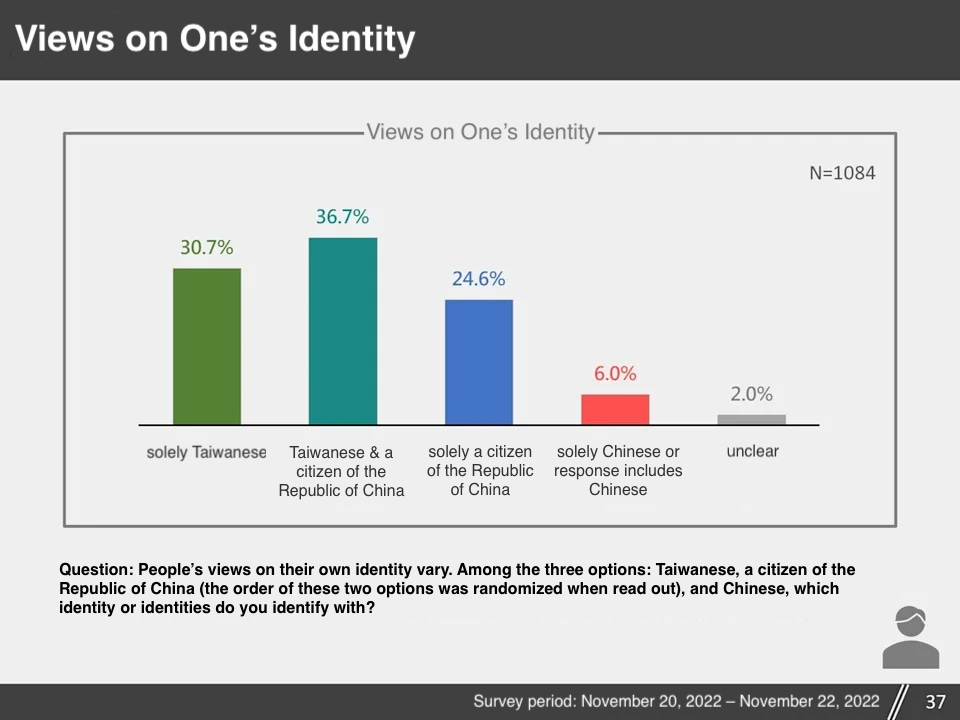Key Taiwan poll on identity is misleading, mainland researcher says
Guo Shanwen at Tsinghua critiques an oversimplistic polling design on identity that he says is then misused. Even comparable polls by pro-independence platforms in Taiwan show more nuances, Guo says.
Today we have an excerpt from an article from Issue 5, 2024, of the Reunification Forum, published by the China Council for the Promotion of Peaceful National Reunification. The author is Guo Shanwen, then Research Fellow at the Institute for Taiwan Studies, Tsinghua University.
Guo claims that the widely-cited “Taiwanese/Chinese identity” survey conducted by the Election Study Centre of National Chengchi University is overly simplistic. The Chinese mainland researcher laments that the pollster was forcing respondents to choose only one answer out of three options—Taiwanese, Chinese, or both—to the key “who are you” question. He claims the way the Q&A is framed lacks depth and sophistication on the profound identity question of residents of the island of Taiwan and leaves ample room for political abuse by the ruling Democratic Progressive Party.

As a comparison, he says other polls, even one conducted by a pro-independence platform Formosa, showed 57.5% of respondents identifying as “a member of the Chinese nation” (中华民族一分子)

Similarly, a poll conducted in November 2023 by the pro-DPP World United Formosans for Independence and the Taiwan National Security Institute revealed that the percentage of respondents identifying solely as “Taiwanese” had dropped from 40.5% to 30.7% over three years, a decrease of 9.8 percentage points.


At the time of this newsletter, the 2024 results of the same poll have already been released, showing a further decline to 30.1%.


Taiwanese identity encompasses various dimensions like birthplace, culture, and political system, says Guo, yet DPP and pro-DPP media have misinterpreted the rise in “Taiwanese” identification in the Election Study Centre of National Chengchi University poll as a political, or more specifically, pro-independence stance. This undermines academic rigour and the complexity of Taiwanese identity, leading to a polarised and misleading narrative that distorts international understandings of Taiwanese identity.
—Yuxuan Jia
The following are excerpts from Guo’s article, not the full text, because the full text, in our opinion, would be too lengthy.
Upon inquiry, Guo now teaches at Guangxi Normal University in the mainland after completing postdoc studies at Tsinghua. He has a PhD from National Cheng Kung University in Taiwan. He reviewed this translation before publication.
对岛内关于台湾民众“身份认同”民调的重新审视
Reexamining Opinion Polls on Taiwanese/Chinese Identity among People in Taiwan
Taiwanese society pays significant attention to public opinion polls, particularly those focusing on themes such as “identity.” In April 2024, during a meeting with Ma Ying-jeou and his delegation, General Secretary Xi Jinping delivered an important speech on cross-strait relations, calling for “resolute efforts to guard the common home of the Chinese nation, work together for the long-term well-being of the Chinese nation, foster a strong sense of community for the Chinese nation, and achieve the great rejuvenation of the Chinese nation.” These four proposals, centred on the concept that “compatriots from both sides of the Taiwan Strait belong to the same Chinese nation,” sparked widespread discussion within Taiwan about “identity."
Among the many polls on “identity” among people in Taiwan, the opinion polls on “Taiwanese/Chinese identity” conducted by the Election Study Center of National Chengchi University over the past 32 years have had a profound influence. However, its overly simplistic identity classification system leaves ample room for political interpretation.
Observations and Reflections on National Identity Polls Among People in Taiwan
1. Observations on Identity Polls Among People in Taiwan
Public opinion polling has become a part of daily life in Taiwan, with local polling organisations and topics becoming increasingly diversified. While the use of online and mobile phone surveys has risen, traditional landline phone surveys remain one of the mainstream methods. In terms of analysis, to adapt to the rapidly changing political environment in Taiwan, polling organisations have begun incorporating big data, artificial intelligence, and other technologies, improving the accuracy and timeliness of data analysis. However, as political polarisation intensifies in Taiwan, trust in poll results has declined among some of its people. This is particularly evident during election periods when poll results are often criticised for influencing voter preferences.
In recent years, polling in Taiwan has exhibited the following characteristics:
First, the public opinion polling market has basically taken shape, with polling organisations showing commercial characteristics.
With the growing demand for polling in Taiwan, the polling market has largely taken shape. To enhance credibility, some media outlets and political party think tanks have restructured their polling departments into commercial entities or outsourced polling to commercial companies. For example, the Want Want China Times Media Group established the Apollo Survey & Research Co. Ltd, the Storm Media operates the Taiwan Indicators Survey & Research [renamed as Storm Polls in 2025—translator’s note], and the polling of ETtoday is supported by a comprehensive market research firm transformed from the Eastern Multimedia Group (EMG) Polling Center.
Second, the overuse of public opinion polls has led to a decline in their credibility. Local media often selectively report poll results to attract attention. Over time, this practice has not only eroded public trust in polls but also increased the likelihood of sample bias.
Third, the politicisation of public opinion polls is particularly prominent during election periods. During election periods, polls enable political parties to adjust campaign strategies in real-time. Especially in a “sann-kha-tu” scenario, where the three candidates are evenly matched, parties may use polls to leverage the “bandwagon effect” or “reverse psychology” to achieve “strategic voting,” where supporters are encouraged to vote for the candidate with the best chance of winning.
Despite the increasing variety of polling topics, surveys related to “identity” remain among the most closely watched and controversial in Taiwan. Over the years, polls have played a pivotal role in shaping the narrative of identity among people in Taiwan. On the one hand, both regular and occasional polls have revealed trends in national identity, reflecting the dynamics of societal identity. On the other hand, the way poll questions are framed and the design of polling options have actively influenced perceptions of identity.
Different polling organisations’ backgrounds and positions affect the design and interpretation of national identity surveys. Media organisations typically have a strong influence on shaping public opinion, while academic institutions focus on tracking and analysing long-term trends.
Key players in polling on identity in Taiwan include the Election Study Centre of National Chengchi University, the Taiwanese Public Opinion Foundation, Global Views Research, Formosa Publishing Co., Ltd., and the TVBS Poll Centre. Among these, the Election Study Centre’s polls, conducted since 1992, are regarded as “authoritative” and have significantly influenced overseas think tanks, media, and cross-strait academic discussions.
However, as with polls on other topics, identity surveys are affected by “house effects.” For example, the Taiwan Public Opinion Foundation, whose core members and founders are associated with the Democratic Progressive Party (DPP), is often seen as pro-DPP in its poll design, analysis, and interpretation. Furthermore, polling organisations conducting identity surveys are shaped by their commercial nature. For instance, the Global Views Research and TVBS Poll Centre, both media-affiliated, are inevitably influenced by the political preferences of their audiences and advertising clients.
2. Analysis and Reflection on the Polls by the Election Study Centre of National Chengchi University
Since 1992, the Election Study Center of National Chengchi University has regularly conducted polls on the “Taiwanese/Chinese Identity” among people in Taiwan. These polls, with their long-term data accumulation, are widely regarded by scholars as a critical tool for analyzing Taiwan's societal changes and understanding the identity of its people. Beyond their academic significance, these polls have also had a profound influence on cross-strait relations and international politics.
In practice, the DPP has relied on the Election Study Centre’s “Taiwanese/Chinese Identity” polls as a key basis for policymaking and as a significant source of legitimacy for its policies. Especially during Tsai Ing-wen’s administration, polls showing an increasing number of people in Taiwan identifying as “Taiwanese” have served as the foundation for policies aimed at strengthening a so-called “Taiwanese identity.” These polls have also been presented as key evidence to support the rise of “Taiwanese nationalism” and counter the concept of a “Chinese national identity.”
Moreover, the polling data has influenced not only Taiwan’s electoral politics but also foreign assessments of the Taiwan Strait situation. External think tanks, when analysing risks in the Taiwan Strait, and international media, when reporting on Taiwan’s identity, often cite data from the Election Study Centre’s polls, emphasising that long-term tracking by an academic institution adds credibility to their reports.
Given its significant influence, it is essential to critically evaluate the content and implications of the Election Study Centre’s “Taiwanese/Chinese Identity” poll. The poll’s design is notably simplistic, posing the question, “In our society, some people identify as ‘Taiwanese,’ others as ‘Chinese,’ and some as both. Do you identify as ‘Taiwanese,’ ‘Chinese,’ or both?” This binary classification oversimplifies the complex concepts of “Taiwanese” and “Chinese,” leading to confusion among respondents. Furthermore, it forces participants to “choose a side”, leaving ample room for political misinterpretation by the DPP.
In reality, “Taiwanese identity” encompasses at least four dimensions: (1)being born in Taiwan, (2) having parents who were born in Taiwan, (3) recognising and identifying with Taiwan's existing way of life, and (4) identifying with Taiwan's current political system. Moreover, “Taiwanese identity” does not inherently align with a position on unification, nor does it equate to “Taiwanese nationalism.” It also does not imply rejecting “Chinese national identity.” Thus, the poll design equates “Taiwanese identity” with political identity, effectively treating it as synonymous with support for “Taiwan independence.”
The DPP has exploited this flaw by intentionally misinterpreting the poll data to suggest that identifying as “Taiwanese” is equivalent to supporting independence. Simultaneously, pro-DPP media and internet users have widely circulated claims that “over 60% of people in Taiwan identify as Taiwanese,” fostering the impression of a broad societal consensus.
It is well known that Taiwan’s political reality is complex, and identity cannot be simply categorised as “Taiwanese,” “Chinese,” or “both.” Such oversimplification disregards the diversity and complexity of identity among the people of Taiwan, undermines academic rigour, and fails to accurately reflect public opinion.
Even polls conducted by Formosa Publishing Co., Ltd., which has strong ties to pro-DPP groups, offer more nuanced options. For example, Formosa’s surveys employ a multi-select format, with options such as “Asian,” “of Chinese heritage,” “a member of the Chinese nation,” “a member of the Austronesian peoples,” “a member of the Republic of China,” “a member of the People’s Republic of China,” “Taiwanese,” “Chinese,” and “uncertain.” In Formosa’s April 2023 poll, 57.5% of respondents identified as members of the Chinese nation.
Similarly, a poll conducted in November 2023 by the pro-DPP World United Formosans for Independence and Taiwan National Security Institute revealed that the percentage of respondents identifying solely as “Taiwanese” had dropped from 40.5% to 30.7% over three years, a decrease of 9.8 percentage points. These results differ significantly from those of the Election Study Centre of National Chengchi University, underscoring the simplistic nature of its poll design.


Enhancing Strategic Resolve and Rationally Approaching Opinion Polls in Taiwan
“Identity” is inherently a complex, multi-dimensional, and dynamic concept, shaped by various factors. Poll data only reflects public attitudes at specific points in time, and it should not be regarded as definitive or permanent. It is essential to conduct in-depth analysis and continuously monitor such data to better understand the social dynamics and diversity underlying the polling results, avoiding oversimplified interpretations. Given the abundance of polls in Taiwan, it is particularly important to maintain strategic resolve.
At the same time, there are various discussions within Taiwanese society regarding polls related to “identity,” often resulting in overinterpretation or misleading conclusions. Public opinion surveys are essentially just auxiliary tools, easily influenced by factors such as sample selection and question design. Particularly, local polls in Taiwan are often affected by “institutional effects” and cannot fully represent the truth. When faced with some so-called authoritative polls within Taiwan, a calm and rational approach is necessary.
Polls are not absolute truths. Researchers and decision-makers should avoid using them as the sole basis for their conclusions. When conducting research or making decisions, it is important to interpret polling trends based on a comprehensive understanding of long-term data.






